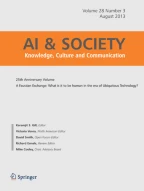Abstract
This paper treats contemporary craft as an under-researched resource for wearable computing, and presents some of the alternative values and experiences that contemporary craft may be able to contribute to the design of personal technological products. Through design and implementation of a suite of wirelessly networked ‘Speckled’ jewellery, it considers contemporary craft for its potential as a critical design resource with especial relevance to wearable computing and the broad development of this paradigm into the everyday. ‘Critical design’ is given a working definition for the purposes of the argument, and a friendship group of five women of retirement age introduced as the user group for this research. Current practice in the contemporary craft genre of jewellery is analysed for its potential as a resource for a critical approach to wearable computing, and based on a set of semi-structured interviews with contemporary jewellery practitioners, the paper presents a set of propositions for a critical craft approach to wearables design.
Similar content being viewed by others
Explore related subjects
Discover the latest articles, news and stories from top researchers in related subjects.References
Arts Council England (2003) Making it in the 21st Century—A socio-economic survey of crafts activity in England and Wales 2002–2003. Accessed 24/05/05. http://www.craftscouncil.org.uk/about/Socio_Econ_Survey.pdf
Barab SA, Thomas MK, Dodge T, Squire K, Newell M (2004) Critical design ethnography; Designing for change. Anthropol Educ Q 35(2):254–268
Boehner K, David S, Kaye J, Sengers P (2005) Critical technical practices as a methodology for values in design. CHI 2005 Workshop on quality, values, and choices
Challenging Craft (2004) Conference held at Gray’s school of Art, Aberdeen, 8–10 September. Accessed 20/05/05. http://www.challengingcraft.org
Cousens C (2004) A sense of place. Lecture given at Craft in Dialogue, IASPIS, September 4th 2004, Konstepidemin, Goteborg, Sweden
Critical Computing (2005) Conference at Aarhus, Denmark, 20–24 August 2005. Accessed 20/05/05. http://www.aarhus2005.org
Cunningham J (2005) Maker, wearer, viewer. Talk given at Association of Contemporary Jewellery event, Glasgow School of Art, 12 April 2005
Dennett DC (1993) Consciousness Explained. Penguin Books Ltd, London
Dormer P (ed) (1997) The culture of craft: status and future. Manchester University Press, Manchester
Dunne A (1999) Hertzian tales. RCA CRD Publications, London
Dunne L (2004) The design of wearable technology: addressing the human-device interface through functional apparel design. Unpublished PhD thesis. Retrieved from http://www.lucydunne.com/ LucyDunneMastersThesis.pdf on 3rd February 2006
Gangestad SW, Snyder M (2000) Self-monitoring: appraisal and reappraisal. Psychol Bull 126:530–555
Gaver WW, Boucher A, Pennington S, Walker B (2004) Cultural probes and the value of uncertainty. Interaction XI(5):53–56
Hutchins E, Palen L (1997) Constructing meaning from space, gesture and speech. In: Resnick LB, Saljo R, Pontecorvo C, Burge B (eds) Discourse, tools, and reasoning: essays on situated cognition. Springer, Berlin Heidelberg New York, pp 23–40
Kälviäinen M (2000) The significance of ‘craft’ qualities in creating experiential design products. The Des J 3(3):4–15
Kettley S (2005a) Crafts praxis as design resource. In: Proceedings of the fifth Engineering and Product Design in Education Conference, Napier University, September 2005 (forthcoming)
Kettley S (2005b) Framing the ambiguous wearable. In: Convivio Online J Accessed 25/05/05. http://webzine.convivionet.net/index.php ?option=com_content&task=view&id=23&Itemid=71
Kyttanen J (2005) Presentation given at interrogating fashion workshop, London College of Fashion, 24 February 2005
McAuley A, Fillis I (2002) Crafts businesses in Scotland—A study. Accessed 25/05/05. http://www.scottisharts.org.uk/1/information/publications/1000910.aspx
Mazanti L (2003) Craft as avant-garde. Lecture delivered at Craft in Dialogue, Stockholm, September 1, 2003
Mazanti L (2004) Re-reading the functional. In: Proceedings of Challenging Craft Conference, 8–10 September 2004, Gray’s school of Art, Aberdeen
O’Toole M (1994) The language of displayed art. Continuum International Publishing, London
Orth M (2001) Sculpted computational objects with smart and active computing materials. PhD thesis, Massachusetts Institute of Technology, Cambridge
Oxlade R (2001) “Good” draughtsmanship or real drawing. In: Blunt Edge, No. 1, April 2001
Peters R (2005) Fool’s gold. Talk given in association with the Embassy Gallery and the Association of Contemporary Jewellery, Edinburgh College of Art, 23rd March 2005
Pye D (1968) The nature and art of workmanship. Cambridge University Press, Cambridge
Speckled Computing Consortium Scotland. Accessed 20/05/05. http://www.specknet.org
Wallace J, Press M (2004) All this useless beauty. In: Proceedings of Pixelraiders2, Sheffield Hallam University, 8–10 April, 2004
Wilson S (2004) Craft not design. In: Proceedings of Challenging Craft Conference, 8–10 September 2004, Gray’s school of Art, Aberdeen
Acknowledgments
The author wishes to thank the participants in the interviews at the Edinburgh College of Art Silversmithing and Jewellery Department, Professor Dorothy Hogg, her doctoral supervisors Dr. Michael Smyth, Dr. Alison Crerar and Professor Jessie Kennedy in the School of Computing at Napier University, Edinburgh, and of course the five women who have taken part so willingly in the research over the past 2 years.
Author information
Authors and Affiliations
Corresponding author
Rights and permissions
About this article
Cite this article
Kettley, S. Crafts praxis for critical wearables design. AI & Soc 22, 5–14 (2007). https://doi.org/10.1007/s00146-006-0075-0
Received:
Accepted:
Published:
Issue Date:
DOI: https://doi.org/10.1007/s00146-006-0075-0
